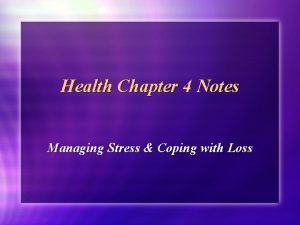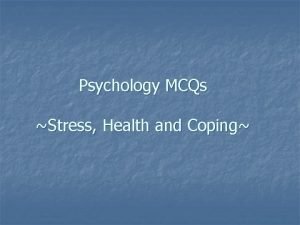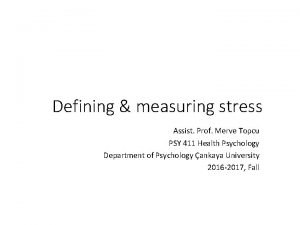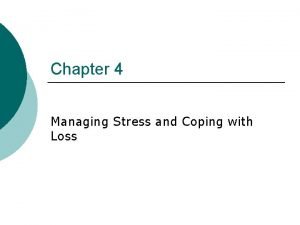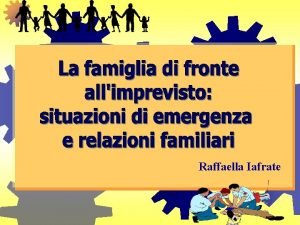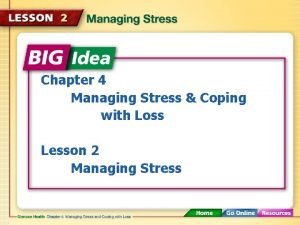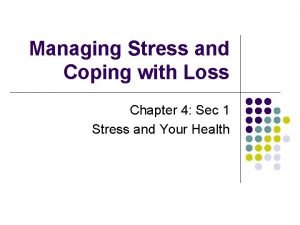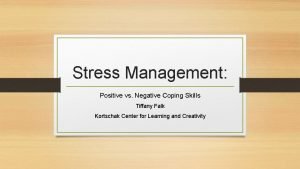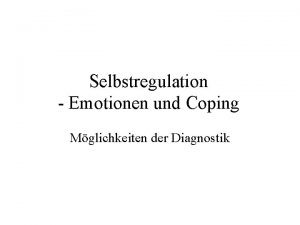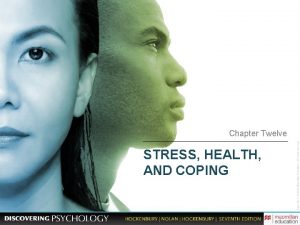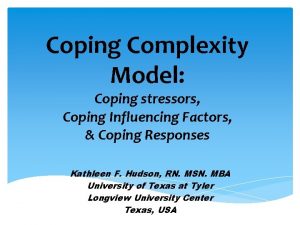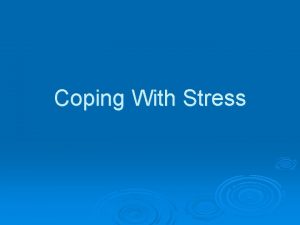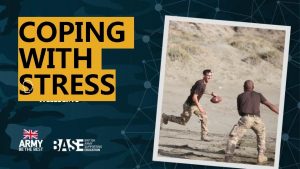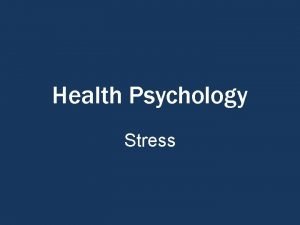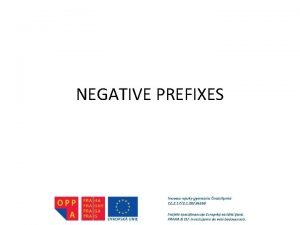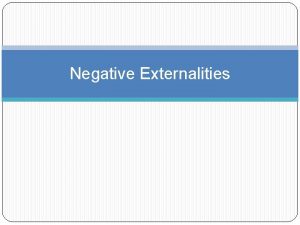Stress Health and Coping Stress Stress A negative















- Slides: 15

Stress, Health and Coping

Stress � � � Stress: A negative concept that can have an impact one’s mental and physical well-being. Stressors: A specific event of chronic pressures that place demands on a person or threatens a persons well-being Chronic stressors: Sources of stress that occur continuously or repeatedly. Many different life events can cause stress, getting married, losing a job, having a breakup, Traffic and many other things.

Some chronic stressors would be strained relationships, nagging relatives, and money problems. Lots of chronic stressors are linked to particular environments like some features of city life, noise, traffic, and a crowding population.

Typically events are most stressful when you feel there is nothing you can do about them. Researchers David Glass and Jermone Signer in classic studies of perceived control looked at the after effects of loud noise on people who could or could not control it. In one study, people were asked to solve puzzles in a room filled with noise. Glass and Singer found that loud burst of noise hurt the people’s performance even after the noise had stopped. But the noise did not affect a group of people who were told they could stop the noise whenever they wanted by pushing a button. No one pushed the bottom but because they thought they had control over the noise, they performance was not affected. People can handle stress better when they feel like they have control over it.

Fight or flight response Walter cannon coined the term fight or flight, the brain asks should I stay and battle this somehow, or should I run like mad. To produce the fight-or-flight response, the hypothalamus activates two systems: the sympathetic nervous system and the adrenal-cortical system. The sympathetic nervous system uses nerve pathways to initiate reactions in the body, and the adrenal-cortical system uses the bloodstream. The hypothalamus tells the sympathetic nervous system to kick into gear, the overall effect is that the body speeds up, tenses up and becomes generally very alert. If there's a burglar at the door, you're going to have to take action -- and fast. The sympathetic nervous system sends out impulses to glands and smooth muscles and tells the adrenal medulla to release epinephrine (adrenaline) and norepinephrine (noradrenaline) into the bloodstream. These "stress hormones" cause several changes in the body, including an increase in heart rate and blood pressure.

What happens to the body during stressful situation ( fight or flight)? vheart rate and blood pressure increase v. Pupils dilate to take in as much light as possible vveins in skin constrict to send more blood to major muscle groups (responsible for the “chill" sometimes associated with fear -- less blood in the skin to keep it warm) vblood-glucose level increases v. Muscles tense up, energized by adrenaline and glucose vsmooth muscle relaxes in order to allow more oxygen into the lungs vnonessential systems (like digestion and immune system) shut down to allow more energy for emergency functions vtrouble focusing on small tasks (brain is directed to focus only on big picture in order to determine where threat is coming from)

In the 1930’s Hans Seyle a Canadian physician came up with the general adaption syndrome, which is a three stage physiological stress response that appears regardless of the stressor that is encountered. §The first phase is the alarm phase, this is when the body rapidly mobilizes its resources to respond to the threat. The alarm phase is equivalent to Cannons fight or flight. §The second phase is the resistance phase, during this phase the body adapts to its state of high arousal as it tries to cope with the stressor. Your body shuts down unnecessary process like digestion and growth to conserve energy. §The third phase is the exhaustion phase, the body’s resistance collapse, which can make you more prone to illness.

The psychology of illness ; When it's in your head One of the minds main influence on the body's health and illness is the minds sensitivity to bodily symptoms.

Recognizing illness and seeking treatment Directing attention toward the body or away from it can influence the symptoms we perceive. Example; when people are bored they have more attention available to direct toward their bodies and so focus more on physical symptoms. Penne baker (1980) audio-taped classrooms and found that people are more likely to cough when someone else has just coughed.

Mental disorders Somatoform disorders ; which the patient displays psychical symptoms not fully explained by a general medication condition. Hypochondriasis ; a psychological disorder in which a person is preoccupied with minor symptoms and develops an exaggerated belief that the symptoms signify a life threatening illness. Psychosomatic illness; an interaction between mind and body can produce illness. Sick role ; a socially recognized set of rights and obligations linked with illness

Optimism An optimist who believe that "in uncertain times, I usually expect the best" is likely to be healthier than a pessimist who believe that "if something can go wrong for me, it will. " Health Promoting Behavior and Self- regulation Even without changing our personalities at all, we can do certain things to be healthy. The importance of healthy eating, save sex, and giving up smoking are common knowledge.

Coping with stress Repressive Coping: Is characterized by avoiding situations or thoughts that are reminders of stressor and maintaining artificially positive viewpoint. Rational Coping: involve facing stressor and working to overcome it. Rational coping is a three-step process. Acceptance, coming to realize that the stressor exists and cannot be wished away. Exposure, attending to the stressor, thinking about it, and even seeking it out. Understanding, working to find the meaning of the stressor in your life Reframing: Changing the way you think is another way to cope with stressful thoughts. Stress Inoculation Training (S I T) is a reframing technique that helps people to cope with stressful situation by developing positive ways to think about the situation.

Unhealthy ways of coping with stress These coping strategies may temporarily reduce stress, but they cause more damage in the long run: §Smoking §Drinking too much §Overeating or under eating §Zoning out for hours in front of the TV or computer §Withdrawing from friends, family, and activities §Using pills or drugs to relax §Sleeping too much §Procrastinating §Filling up every minute of the day to avoid facing problems §Taking out your stress on others (lashing out, angry outbursts, physical violence)

Healthy ways to relax and recharge § Get exercise §Talk to a good friend §Listen to music §Write in a journal §Work out §Read a good book §Get a massage

 Leasiest
Leasiest Mcqs on stress management
Mcqs on stress management Stress appraisal and coping
Stress appraisal and coping Chapter 4 managing stress and coping with loss lesson 1
Chapter 4 managing stress and coping with loss lesson 1 Family stress and coping
Family stress and coping Chapter 4 managing stress and coping with loss
Chapter 4 managing stress and coping with loss Chapter 4 managing stress and coping with loss
Chapter 4 managing stress and coping with loss Define coping skills
Define coping skills Abrafile
Abrafile Stress strain coping support model
Stress strain coping support model Coping strategies for exam stress
Coping strategies for exam stress Coping arten
Coping arten Jeopardy mental health
Jeopardy mental health Chapter 4 lesson 3 coping with loss and grief
Chapter 4 lesson 3 coping with loss and grief When the signs are the same
When the signs are the same Negative velocity negative acceleration
Negative velocity negative acceleration
